This event has now ended.
Auschwitz survivors warned of rising antisemitism and hatred in the modern world on Monday as they recounted the horrors they had witnessed at the Nazi death camp on the 80th anniversary of its liberation.
In what is likely to be one of the last gatherings of those who experienced its horrors, 56 people who were freed by Soviet Union troops on Jan. 27, 1945, were joined by dignitaries from around the world in a giant heated tent over the camp's gate for a ceremony to mark one of the world's worst atrocities.
Among those in attendance were German Chancellor Olaf Scholz, Britain's King Charles III, Ukrainian President Volodymyr Zelenskyy and his French counterpart, Emmanuel Macron, along with many other leaders. Israeli Education Minister Yoav Kisch was also present.
More than 1.1 million people, mostly Jews, died in gas chambers or from starvation, cold and disease at Auschwitz before Soviet troops arrived at the gates. Some 6 million Jews were killed across German-occupied Europe from 1941 to 1945.
Those attending the event listened to speeches from three people who survived.
Among them was the author Tova Friedman, who was just 5 years old when she was sent to the camp and lay among bodies to hide from Nazi soldiers rounding up other children.
Now 86, she said that she is still haunted by the memories she has of that time. “After all the children were gone and the courtyard was empty,” she said, “I thought to myself, ‘Am I the only Jewish child left in the world?’”
Leon Weintraub, 99, said his mother, sister and aunt were killed in a gas chamber shortly after they arrived at the camp.
Urging young people to be discerning in the new digital world and sensitive to expressions of intolerance and the resentment of marginalized people, he said the survivors understood “that the consequence of being considered different is active persecution, the effects of which we have personally experienced.”
Piotr M.A. Cywiński, the director of the Auschwitz-Birkenau Memorial and Museum, thanked the survivors for sharing their recollections.
“It is not the facts of the war that are painful, but the memories that hurt, help and guide us,” he said.
Ceremony concludes with survivors laying candles
The commemoration ceremony to remember the liberation of Auschwitz has ended.
But survivors, their relatives and dignitaries are laying candles on a table at the front of the tent where the event took place.
Jewish leaders recite the Kaddish and Psalm 42
Jewish leaders took to the stage to recite the Kaddish, a prayer praising God that is delivered during synagogue services.
This was followed by a reading of Psalm 42, a lament about an isolated believer who is longing for God’s presence.
Composition by Gideon Klein brings conclusion to the speeches
The music “Lullaby” by Jewish composer and pianist Gideon Klein brings the speeches to an end.
Klein, a Czech national, studied at the Prague Conservatory of Music while completing high school, according to a biography by the Auschwitz-Birkenau Memorial and Museum.
In October 1944, he was deported to Auschwitz, and then to the Fürstengrube subcamp, where he died in January 1945, it added.
Museum director thanks survivors for sharing their memories
Memory is the key to understanding the world and designing the future, Auschwitz Museum Director Piotr Cywiński said as he thanked the survivors of the camp for sharing their memories with the world.
“There are no words, dearest ones, to express the depth of our gratitude,” Cywiński said in his address.
As a man born after World War II, Cywiński said he learned the history of the camp but emphasized that a knowledge of facts is not the same as hearing the memories.
“It is not the facts of the war that are painful but the memories that hurt, help and guide us,” he said. “But what are we to do with this memory today?” he added. “If today, my friend, you feel uncertain about what to do, if you feel powerless, if you feel you cannot go on, then perhaps you have reached a limit.”
“If so, know that limits are only imaginary,” he said. “You can always do more.”
Lessons of Auschwitz are lessons 'for the entire world,' museum donor says
The lessons learned from Auschwitz and the Holocaust are “not just for Jews, they’re for the entire world,” philanthropist Ronald Lauder said in a speech on behalf of the museum's donors.
Lauder drew parallels from the rise of Nazi Germany to the issues of today, quoting survivor Elie Wiesel, who said, “Most people think the opposite of love is hate. It’s not, it’s indifference.”
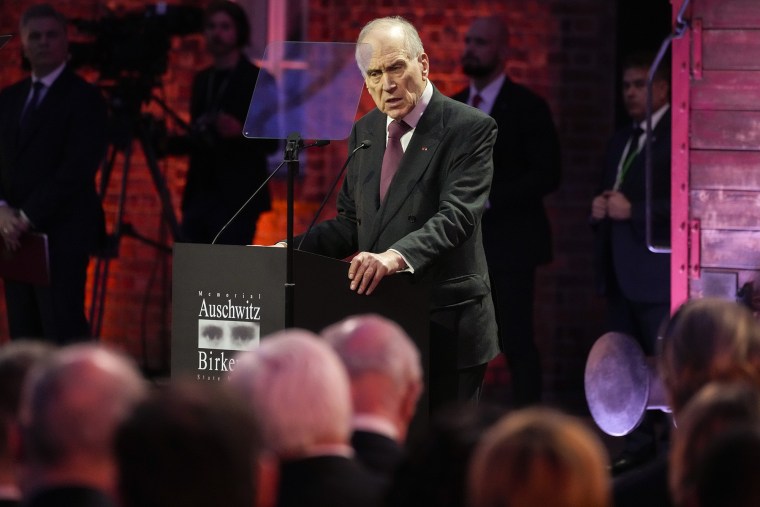
The rise of the Nazis was a step-by-step process “advanced by the indifference” of people who thought they were unaffected by antisemitism, Lauder said.
“Today is the same story, silence, indifference and the exception of that this hatred,” Lauder said. “So today, all of us must take a pledge to never be silent when it comes to antisemitism or, for that manner, any other hatred.”
'Take seriously what the enemies of democracy preach,' Weintraub says
In a world where intentions can be hard to distinguish, Weintraub urged the world “to be sensitive to all expressions of intolerance and resentment to those who are different.”
For young people in a digitial world it can be difficult to discern true intention from “the pursuit of popularity,” he said, adding that it was time to “take seriously what the enemies of democracy preach.”
“We the survivors, we understand that the consequence of being considered different is active persecution, the effects of which we have personally experienced,” Weintraub told the crowd. “And we did experience in the very heart.”
Auschwitz stripped us of 'all humanity,' 99-year-old survivor recalls
Leon Weintraub, 99, was just a schoolchild when his family was moved into a ghetto following the Nazi invasion of Poland.
He told the crowd that after the ghetto was liquidated he was sent with his family to the Auschwitz camp, where his mother, sister and aunt were murdered in the gas chamber shortly after they arrived.
“We were stripped of all our humanity,” Weintraub said. “First, we were stripped naked and robbed of all our house belongings. Then they shaved all our hair, quite often with painful skin removal.”
He said he was “utterly alone” after the separation from his family, sneaking out weeks later. But he added that he was caught and forced into labor outside the camp until he was liberated by French troops.
One of the youngest survivors says she celebrates liberation like ‘this is my birthday’
One the youngest survivors of the Holocaust, Tova Friedman, was just 6 years old when Auschwitz was liberated on Jan. 27, 1945.
For her "whole life since I was a little girl," she thought of that day "as my birthday," she told the crowd. "I celebrate it every single year," she added.
Her memory of her time in the camp remains vivid in part because her mother validated her experiences at a young age, Friedman said, adding that she remembered listening to her friends being rounded up while the cries of their parents fell on deaf ears.
“After all the children were gone and the courtyard was empty,” she said. “I thought to myself, am I the only Jewish child left in the world?”
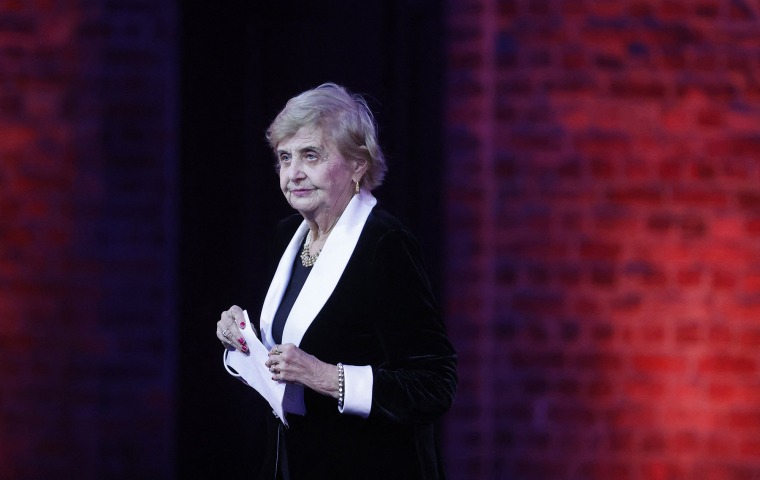
We have seen a 'huge rise in antisemitism,' Holocaust survivor warns
We have seen a “huge rise in antisemitism and that is precisely what led to the Holocaust,” Turski said, adding that we should not “fear discussing the problems that torment the so-called last generation.”
“Let us not be afraid to convince ourselves that we can solve problems between neighbors because for centuries on many continents, many nations, many peoples and many ethnic groups have lived and had their homes among one another and between one another,” he said.
“Luckily there are the positive experiences as well when both the sides reach the conclusion that they have no other way of securing a peaceful, safe and secure life for their children, grandchildren and for future generation than leading to a compromise,” he said.
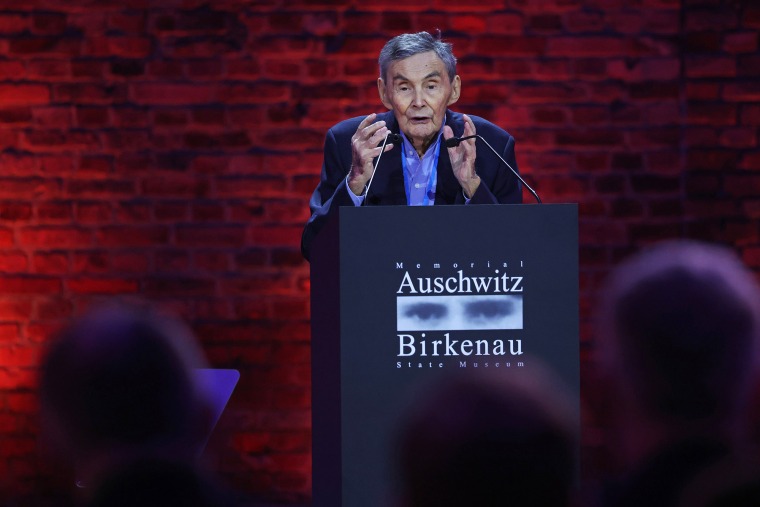
Commemoration ceremony begins with music and a speech from a survivor
The commemoration ceremony has begun inside a heated tent covering the gates of the Auschwitz-Birkenau concentration camp.
Music by the German Jewish composer James Simon, who died in a gas chamber at the camp in 1944, opened the proceedings.
This was followed by a speech from survivor Marian Turski, who was 14 when he was forced into the Lodz Ghetto with his family. He survived two death marches, and at the end of the war he was liberated.
Turski paid tribute to the “millions of victims who will never tell us what they experienced or felt.” He also asked the crowd to stand up for a moment’s silence.
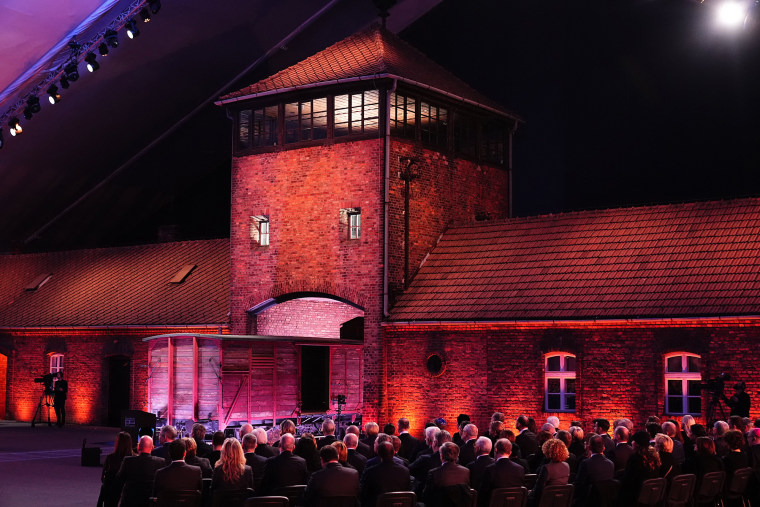
Italy's Meloni calls the Holocaust a 'tragedy unparalleled in history'
Reporting from Rome
Italian Prime Minister Giorgia Meloni described the Holocaust as a “tragedy unparalleled in history,” and warned that “antisemitism was not defeated when the gates of Auschwitz were pulled down.”
Describing it as a "scourge," in a statement Meloni said antisemitism had “survived the Holocaust and has taken on different forms, spreading through new means and channels.”
She also acknowledged the complicity of the fascist regime in Italy, “with its disgraceful racial laws and involvement in rounding up and deporting people.”
Meloni’s statement appears to differ from comments she made in the past. As a young activist, she joined Italy’s “Youth Front,” a wing of the neofascist political party MSI (Italian Social Movement).
In 1996, as a 19-year-old activist, she said in an interview with a French TV network that she thought Italy's fascist leader Benito Mussolini "was a good politician, everything he did he did it for Italy."
Since becoming prime minister, she has said that those nostalgic for fascism “have no place” in Italian political life.
King Charles III gives a remembrance speech in Krakow
King Charles III will become the first British monarch to visit the Auschwitz death camp when he joins survivors and other dignitaries at the ceremony later today.
Ahead of his visit, the monarch traveled to the Jewish Community Centre in the Polish city of Krakow where he said that International Holocaust Remembrance Day was “both a somber and indeed a sacred moment” to remember those who were systematically murdered during the Holocaust.
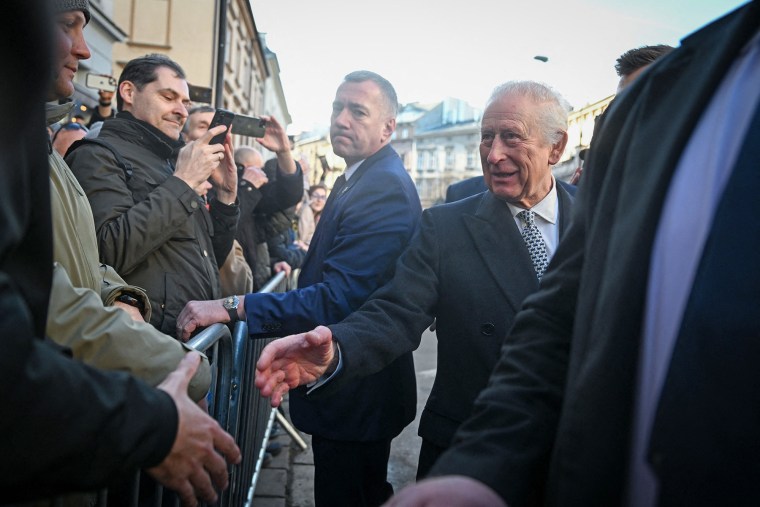
“The act of remembering the evils of the past remains a vital task. In so doing, we inform our present and shape our future,” he said.
Charles has visited the camp several times. While his mother Queen Elizabeth II did visit Bergen-Belsen, a Nazi concentration camp in Germany, she did not travel to Auschwitz.
Lone train car dedicated to the memory of Hungarian Jews
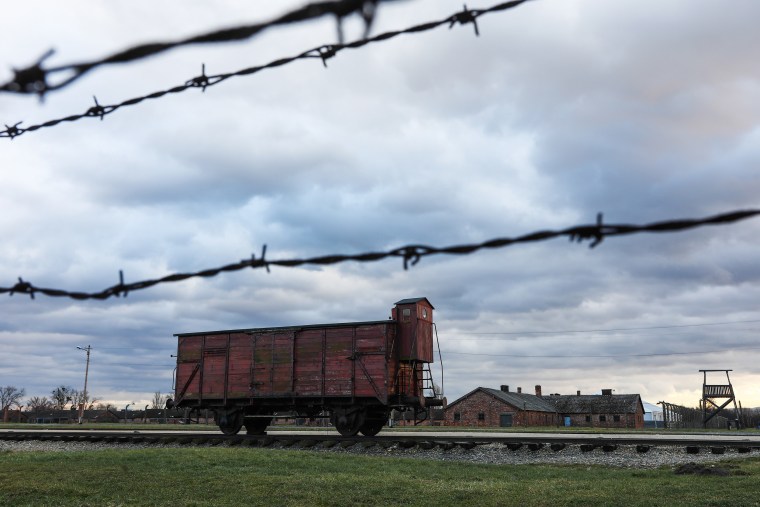
A lone freight train car has been directly in front of the main gate of Auschwitz II-Birkenau camp since 2009.
Placed in the middle of the unloading ramp, the train car is dedicated to the memory of about 420,000 Jews from Hungary who were deported to Auschwitz from May to July 1944.
“These wagons connected ghettos and hiding places with the Place of Death,” Piotr M. A. Cywiński, the director of the Auschwitz Museum, said in 2009 when the car was unveiled.
Auschwitz survivors lay wreaths
Auschwitz survivors laid wreaths to mark the 80th anniversary of the liberation of the Nazi death camp by Soviet troops.
In a quiet and somber moment, the event commemorated more than 1.1 million people, mostly Jews, who perished in gas chambers or from starvation, cold and disease at the camp.
Four Auschwitz survivors to speak at the main commemoration
Four survivors of the former Auschwitz II-Birkenau camp are scheduled to speak at the main commemoration in a heated tent built over the gate to the camp.
Marian Turski, 98, a journalist, historian and social activist who was sent to Auschwitz in 1944 and survived the westward “death march” to Buchenwald in 1945, will open proceedings at 4 p.m. local time (10 a.m. ET).
Tova Friedman, the 86-year-old author of the book “The Daughter of Auschwitz,” who was transported with her mother to the camp at just 5 years old, will also address the crowd.
Leon Weintraub, 99, a physician who was sent to Auschwitz in 1944 after being separated from his family, and Janina Iwanska, a retired pharmacist who was expelled from her home during the Warsaw uprising and taken to the camp in a freight train in 1944, will also speak.
Ukrainian President Volodymyr Zelenskyy arrives in Poland
Ukrainian President Volodymyr Zelenskyy has arrived in Poland to participate in the ceremony, his spokesperson Sergiy Nykyforov said.
Zelenskyy also plans to hold bilateral meetings with European Council President Antonio Costa and French President Emmanuel Macron during his visit, Nykyforov added.
Earlier, Zelenskyy joined rabbis and diplomats to honor the memory of Holocaust victims at the Babyn Yar National Historical and Memorial Reserve in Ukraine's capital, Kyiv.
“We must overcome the hatred that gives rise to abuse and murder. We must prevent forgetfulness. And it is everyone’s mission to do everything possible to prevent evil from winning,” he said in a statement.
Auschwitz survivors mark anniversary
Standing beside the so-called "Death Wall" inside Auschwitz, some remaining survivors and their relatives held candles during the ceremony to mark the camp's liberation.
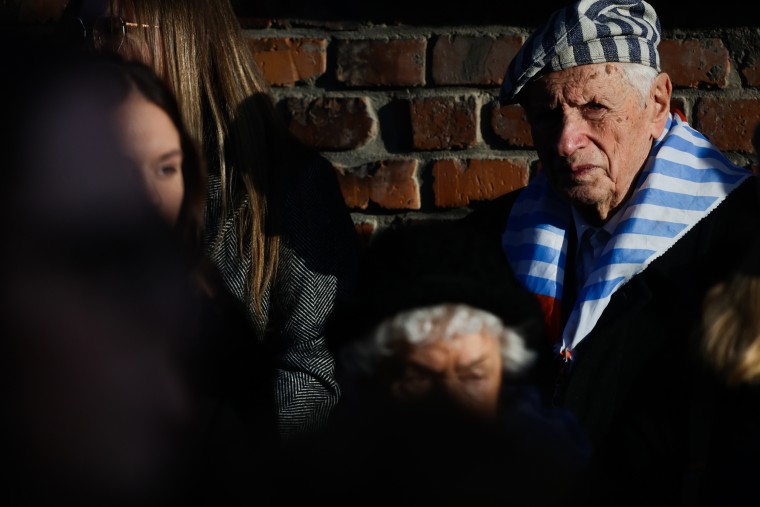
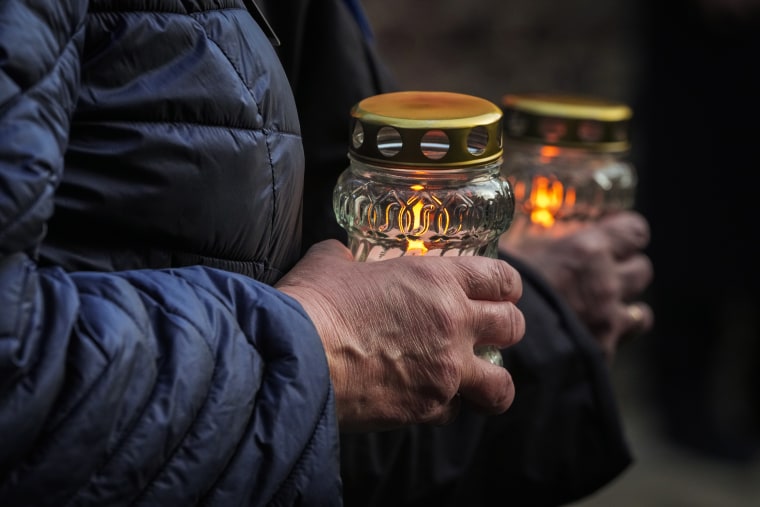
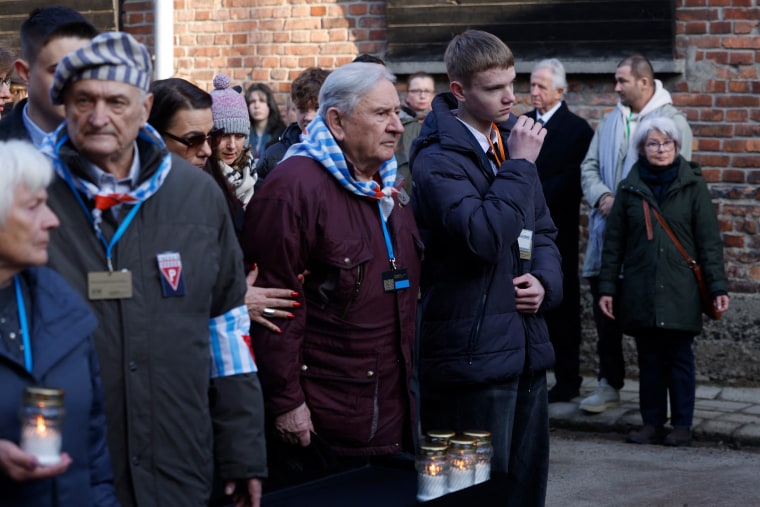
This year is particularly poignant because only a handful of survivors have decided to return this year and it will likely to be one of the last events attended by those who suffered the horrors of the camp.
Piles of human hair tell harrowing story
Reporting from Oświęcim, Poland
Out of respect for the victims, we are forbidden from photographing what may be the most harrowing images here: piles of human hair.
Touring the Auschwitz I camp over the weekend, I entered a room. In the corner to the right of the doorway was a glass case with multiple braids of hair sitting on top of fabric. The textile was also made from human hair.
Then I turned and noticed there was a window the length of the long room; it was dark on the other side. I realized what I was looking at: an entire case filled with mounds of human hair, much much of it dark with some blonde strands mixed in.
That’s estimated to be the hair of roughly 40,000 people. It’s a haunting image I won’t forget.
European Commission remembers Holocaust victims
The European Commission, the E.U.'s executive arm, marked 80 years since the liberation of Auschwitz in a post on X.
"Today, we remember all the victims murdered during the Holocaust," it posted, adding, "This memory must be passed to future generations."
The E.U. Parliament plans to commemorate International Holocaust Remembrance Day with a solemn plenary session in Brussels on Wednesday, Jan. 29, at noon local time (6 a.m. ET).
NBC News' Jesse Kirsch reports 80 years after Auschwitz's liberation
NBC News' Jesse Kirsch reports from Auschwitz 80 years after the largest Nazi extermination camp’s liberation. The team is speaking to survivors —eyewitnesses to genocide — on International Holocaust Remembrance Day.
Archival photos depict Auschwitz prisoners
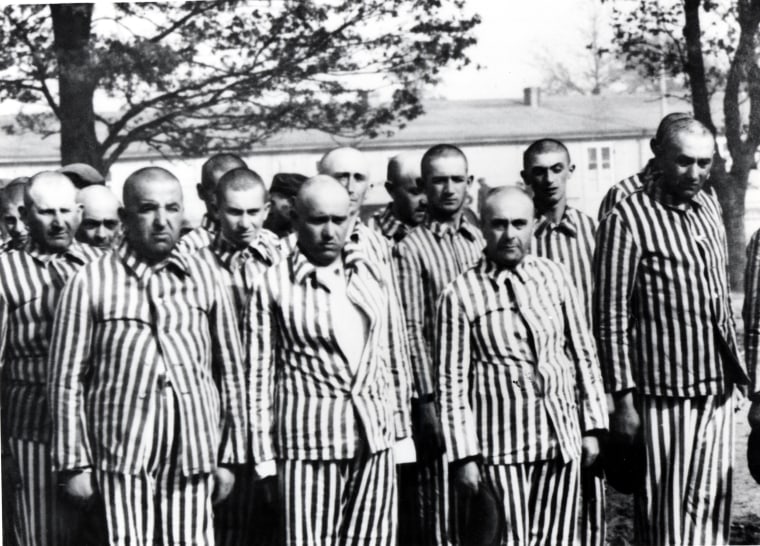
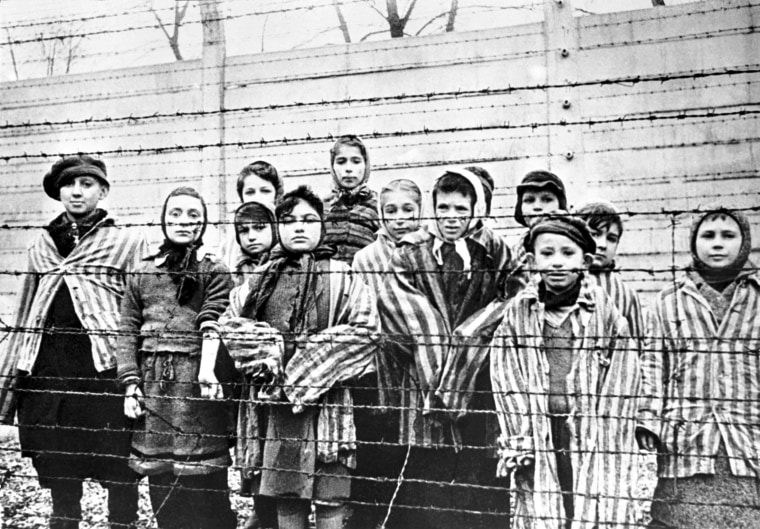
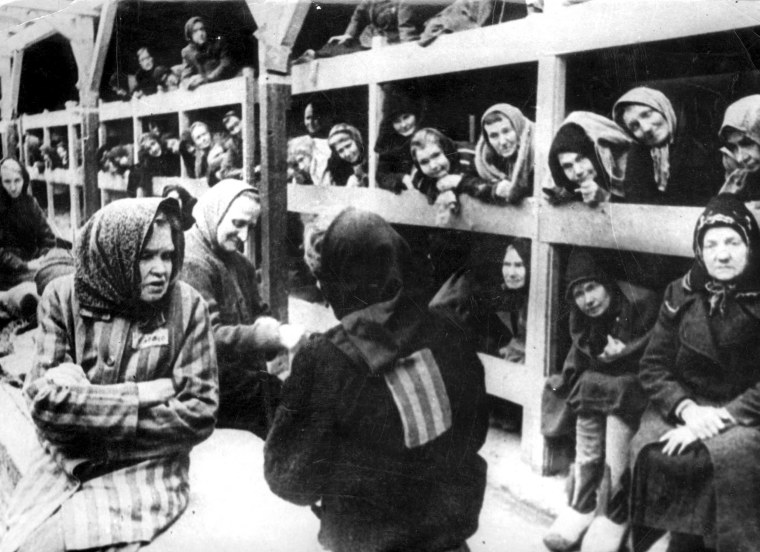
Blank expression, barbed wire and an occassional smile for liberators — photographs from Auschwitz-Birkenau 80 years ago offer a glimpse of what greeted Soviet soldiers who entered the camp. First the liberating forces were shocked at the death and depravity they encountered; soon the world would be too.
Auschwitz survivors mark 80 years since Nazi death camp’s liberation
Reporting from Oświęcim, Poland and New York.
OŚWIĘCIM, Poland — Eva Umlauf was only 2 when Soviet Red Army troops liberated her and her mother from Auschwitz concentration camp — too young to remember the actual day. But the Holocaust is etched onto her skin — A-26,959 tattooed on her left forearm, marking her for life, along with some other Auschwitz survivors.
“You are just a number,” Umlauf, 82, a pediatrician from Munich, told NBC News, explaining how this number will forever make her feel. “But this number is not only on the skin. This is deeper.”
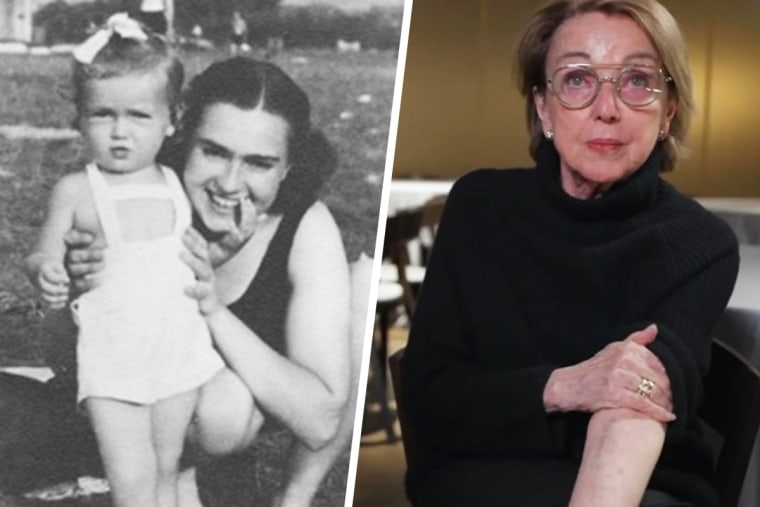
For Umlauf, who traveled for the ceremony along with her sister, son and one of her grandchildren, this was more than a personal journey of memory and reflection. It was a moral responsibility.
“They have to know that it’s true. You know, because it’s so, so unbelievable, unbelievable that nobody can believe this,” she said.
In the eyes of so many around the world, survivors like Umlauf's very existence is a resounding act of defiance against the world-historic cruelty and vast injustice of Adolf Hitler’s reign of terror. Their stories of survival are also implicit pleas to the world: Never forget humanity’s capacity to commit unthinkable crimes.



